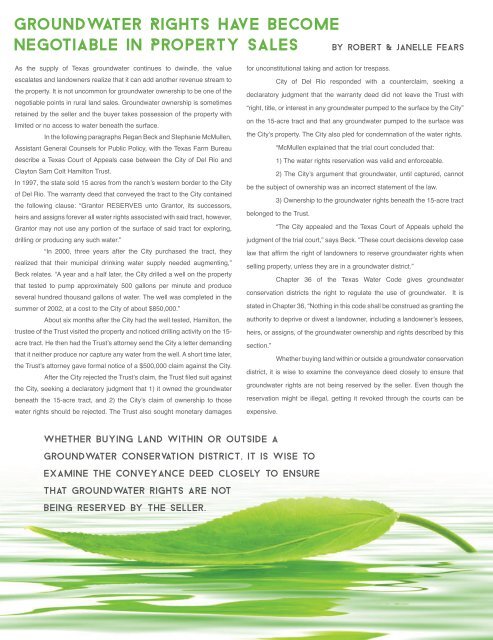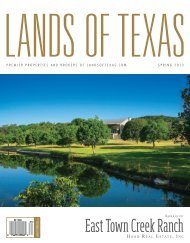You also want an ePaper? Increase the reach of your titles
YUMPU automatically turns print PDFs into web optimized ePapers that Google loves.
Groundwater Rights Have Become<br />
Negotiable in Property Sales<br />
As the supply of Texas groundwater continues to dwindle, the value<br />
escalates and landowners realize that it can add another revenue stream to<br />
the property. It is not uncommon for groundwater ownership to be one of the<br />
negotiable points in rural land sales. Groundwater ownership is sometimes<br />
retained by the seller and the buyer takes possession of the property with<br />
limited or no access to water beneath the surface.<br />
In the following paragraphs Regan Beck and Stephanie McMullen,<br />
Assistant General Counsels for Public Policy, with the Texas Farm Bureau<br />
describe a Texas Court of Appeals case between the City of Del Rio and<br />
Clayton Sam Colt Hamilton Trust.<br />
In 1997, the state sold 15 acres from the ranch’s western border to the City<br />
of Del Rio. The warranty deed that conveyed the tract to the City contained<br />
the following clause: “Grantor RESERVES unto Grantor, its successors,<br />
heirs and assigns forever all water rights associated with said tract, however,<br />
Grantor may not use any portion of the surface of said tract for exploring,<br />
drilling or producing any such water.”<br />
“In 2000, three years after the City purchased the tract, they<br />
realized that their municipal drinking water supply needed augmenting,”<br />
Beck relates. “A year and a half later, the City drilled a well on the property<br />
that tested to pump approximately 500 gallons per minute and produce<br />
several hundred thousand gallons of water. The well was completed in the<br />
summer of 2002, at a cost to the City of about $850,000.”<br />
About six months after the City had the well tested, Hamilton, the<br />
trustee of the Trust visited the property and noticed drilling activity on the 15-<br />
acre tract. He then had the Trust’s attorney send the City a letter demanding<br />
that it neither produce nor capture any water from the well. A short time later,<br />
the Trust’s attorney gave formal notice of a $500,000 claim against the City.<br />
After the City rejected the Trust’s claim, the Trust filed suit against<br />
the City, seeking a declaratory judgment that 1) it owned the groundwater<br />
beneath the 15-acre tract, and 2) the City’s claim of ownership to those<br />
water rights should be rejected. The Trust also sought monetary damages<br />
for unconstitutional taking and action for trespass.<br />
City of Del Rio responded with a counterclaim, seeking a<br />
declaratory judgment that the warranty deed did not leave the Trust with<br />
“right, title, or interest in any groundwater pumped to the surface by the City”<br />
on the 15-acre tract and that any groundwater pumped to the surface was<br />
the City’s property. The City also pled for condemnation of the water rights.<br />
“McMullen explained that the trial court concluded that:<br />
1) The water rights reservation was valid and enforceable.<br />
2) The City’s argument that groundwater, until captured, cannot<br />
be the subject of ownership was an incorrect statement of the law.<br />
3) Ownership to the groundwater rights beneath the 15-acre tract<br />
belonged to the Trust.<br />
“The City appealed and the Texas Court of Appeals upheld the<br />
judgment of the trial court,” says Beck. “These court decisions develop case<br />
law that affirm the right of landowners to reserve groundwater rights when<br />
selling property, unless they are in a groundwater district.”<br />
Chapter 36 of the Texas Water Code gives groundwater<br />
conservation districts the right to regulate the use of groundwater. It is<br />
stated in Chapter 36, “Nothing in this code shall be construed as granting the<br />
authority to deprive or divest a landowner, including a landowner’s lessees,<br />
heirs, or assigns, of the groundwater ownership and rights described by this<br />
section.”<br />
Whether buying land within or outside a groundwater conservation<br />
district, it is wise to examine the conveyance deed closely to ensure that<br />
groundwater rights are not being reserved by the seller. Even though the<br />
reservation might be illegal, getting it revoked through the courts can be<br />
expensive.<br />
Whether buying land within or outside a<br />
groundwater conservation district, it is wise to<br />
examine the conveyance deed closely to ensure<br />
that groundwater rights are not<br />
being reserved by the seller.<br />
36<br />
S u m m e r 2 0 1 3

















